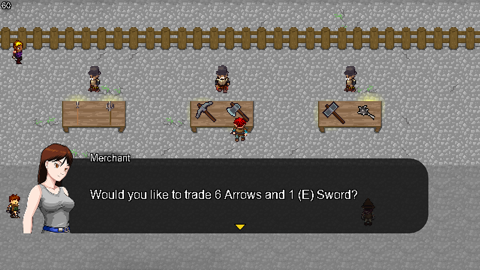An idea I have had early on is bartering in a game. Most games, and even real life, have some kind of currency where one can buy goods and services. Money is really just a form of agreed upon currency that society has determined. But in reality, the value of money is just made up. When someone spends money, one is buying into the value of the good or service, relative to their own wants or needs. For example, a $300 Nintendo Switch, which I think is “awesome”, is “worthless” to my Grandma; there is no value of a Switch for her. So if we really think about it, we’re all just bartering goods and services with a standard exchange rate. Therefore, early on in the game’s development, I thought “what if there was no established currency? What kind of ‘new’ game mechanics could come out of it?”
In Violet, maybe a player perceives the agile weapons as superior, while another player likes the mechanics of the element rods better. Instead of the game (e.g. the developer, me) determining what an item or object is worth, we’ll let the player decide.

In all economic systems, all goods and services have some kind of “value”, or mathematically, a number associated with it. The game will still attach a “perceived value” to each item in the game as a starting point. But with a bartering system, those you are trading with in the game can fluctuate that value. Maybe firewood is “more valuable” in the cold mountains, where as “ice cream” is more valuable in the tropical region. Or perhaps a NPC really likes apples, while another really likes balanced weapons.
We believe this could be an interesting mechanic for two reasons:
- For those like me, who do not normally talk to NPCs in games, now have a reason to interact with them. The more you get to know someone, the more you get to know their likes and dislikes. If a particular NPC has a sword, and you know they love apples, the player can be advantageous and trade their unnecessary apples for a new sword.
- The “collectathon” element of the game becomes more valuable, because anything could become currency. The player may stumble upon some junk that may end up being someone else’s treasure.
One drawback is it could be tedious for the player to get goods and services in Violet. One way we’ve remedied that is by having the NPC automatically go through your inventory and choose what to trade. Right now it’s at random, but could easily be improved upon by adding some intelligence, such as not rechoosing something the player already rejected, or being biased based on the NPC’s preferences.
The other drawback is that there isn’t that one established collecting item (currency) that players will drive towards. For example, there isn’t a concept of rewarding the player with “money” because, there is no money. Getting the “collectathon” element of the game right becomes extremely important.
Right now, bartering is just in a proof-of-concept. But so far, we really like the direction of where this mechanic is going. We are excited to see how this feature gets better over time.
Other Notable Features and Fixes in the Past Month
This past month was more of a refactoring and cleaning up TODOs month. I hadn’t really gone through and cleaned up anything since the beginning of the year, and there were definitely a big list of things needing cleaned up. However, there was a few new notable features as well. Here’s the list:
- Abstracted “Menuing” for NPCs, Pause Menu, etc.
- If we are going to be able to barter, we need to be able to menu. We abstracted the menuing system from the pause menu and made it is own thing that can be used anywhere. This means NPCs are now able to respond to input from the player.
- Added “Eat to Full Health”.
- Instead of rapid fire eating a one heart healing item, we’ve add the ability to “eat to full health”, which allows the user to menu once and eat as many of an item that is needed to be at “full health.”
- Began adding a new area — the intersection between forest and grasslands.
- Added
$to hold text injection for dynamic text for NPCs.- For example, the translation file has “Would you like to trade $?” and we can inject dynamic text into the
$placeholder (read “Would you like to trade 10 arrows?”).
- For example, the translation file has “Would you like to trade $?” and we can inject dynamic text into the
- If a soldier enemy continues to get stunned, they will immediately attack hero.
- This prevents the player from taking complete advantage of a stunned soldier type enemy. We may abstract this out to only certain soldier type enemies in the future.
- Infinite clouds during paused fixed
- When you pause a game, you’re not really pausing the game, but rather “deactivating” things. Apparently, I did not deactivate the controller that generates clouds when paused. But, we were deactivating the controller that despawns clouds. Thus, keeping the pause screen on for too long caused resuming the game to be pretty foggy.
- Fire spreads correctly again.
- Temperature with fire was incorrect when there was fire loaded.
- Even if the player wasn’t near fire, the player was “warmed up” as if they were.
- Many TODOs completed / patched as well as other optimizations.
- As mentioned, this was a big month of refactoring and clean up. Hopefully we’ll have better foundation to continue building new features upon.
